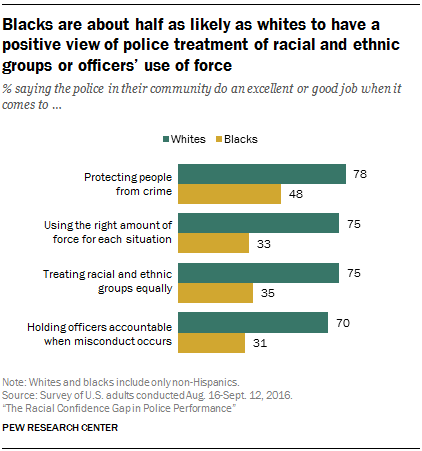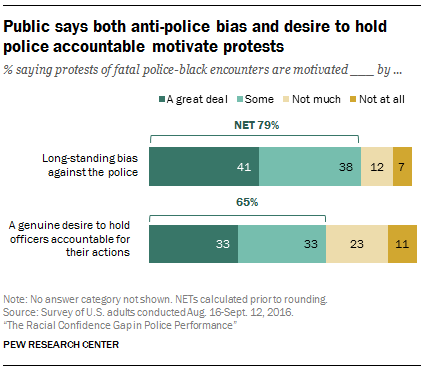The deep racial tensions seen in many areas of American life 1 underlie how blacks and whites view police in their communities, as well as their reactions to the deadly encounters in recent years between blacks and law enforcement officers, according to a new survey by Pew Research Center.

Only about a third of blacks but roughly three-quarters of whites say police in their communities do an excellent or good job in using the appropriate force on suspects, treating all racial and ethnic minorities equally and holding officers accountable when misconduct occurs. Roughly half of all blacks say local police do an excellent or good job combating crime – a view held by about eight-in-ten whites.
Blacks and whites also differ over the root causes of the fatal incidents between police and blacks in recent years. Even before the recent lethal encounters between police and black men in Tulsa and Charlotte, the survey found that blacks are 25 percentage points more likely than whites to say the deaths of blacks during encounters with police in recent years are signs of a broader societal problem and not merely isolated incidents.
At the same time, whites and blacks both see the complexity of the situation. Majorities of each race say that both anti-police bias and a genuine desire to hold officers accountable for their actions play a part in fueling the protests that have often followed these fatal incidents, though whites are more skeptical than blacks about the demonstrators’ motives. There is less agreement on which is the more important motivator: For whites, it is anti-police bias (85% vs. 63% who see a sincere desire to promote accountability); for blacks it’s reversed (79% of blacks cite accountability, 56% opposition to the police).
The survey, conducted Aug. 16-Sept. 12 online and by mail among 4,538 U.S. adults, also found that about eight-in-ten blacks and a larger share of whites favor the use of body cameras by police to record encounters with citizens. Majorities of both races also believe that the use of so-called body cams would prompt officers to act more appropriately when dealing with the public.
The survey was completed before a recent deadly encounter in Tulsa, Oklahoma, that left a black man dead and the white officer who shot him charged with manslaughter, as well as a fatal shooting of a black man in Charlotte, North Carolina, that sparked two nights of unrest in that city.
Blacks are less confident than whites in their local police

Only about one-third (36%) of the public says they have a lot of confidence in their police department. An additional 41% of Americans say they have some confidence in their community’s police department.

Confidence in local police is considerably lower among blacks. Just 14% of blacks say they have a lot of confidence in their local police, and 41% say they have some confidence. By comparison, about four-in-ten whites (42%) say they have a lot of confidence in their local police, and another 39% say they have some confidence. Among Hispanics, 31% say they have a lot of confidence, and another 48% say they have some confidence in their police. 2
Limited confidence in community institutions is not limited to the police department. In fact, fewer Americans say they have a lot of confidence in the other local institutions asked about in the survey than say this about their police: Some 17% of the public says they have at a lot of confidence in the courts in their community, and 15% say the same about their city or local government. Confidence in these institutions is also lower among blacks than whites. For example, 49% of blacks say they have at least some confidence in the courts in their community, compared with 70% of whites.
Wide racial gaps in views of police performance

When it comes to some key aspects of their job, the police are rated more positively than negatively, but wide racial gaps persist. A majority of Americans say the police department in their community is doing an excellent or good job in protecting people from crime (72%), using the right amount of force for each situation (67%), treating racial and ethnic groups equally (65%) and holding officers accountable when misconduct occurs (63%).
But whites are about twice as likely as blacks to give their community’s police department high marks in most of these areas. Across most of the areas, a majority of Hispanics say their local police are doing an excellent or good job.

Most whites (75%) say their local police do an excellent or good job when it comes to using the right amount of force for each situation. Only 33% of blacks share this view; 63% say the police do only a fair or poor job in this area. About six-in-ten Hispanics (62%) say their community’s police are doing at least a good job in this area, while 35% say they are doing only a fair or poor job.
When it comes to treating racial or ethnic groups equally, 35% of blacks say the police department in their community does an excellent or good job, compared with 75% of whites. Conversely, about a quarter (23%) of blacks say their police department does only a fair job and about four-in-ten (38%) say they do a poor job. (Among whites, about a quarter – 24% – say their department does only a fair job or a poor job in treating racial and ethnic groups equally.) Roughly six-in-ten Hispanics (58%) say their local police are doing an excellent or good job in this area, while 38% say they are doing only a fair or poor job.
Some 31% of blacks say the police in their community are doing an excellent or good job when it comes to holding officers accountable when misconduct occurs. By comparison, 70% of whites say the same. About three-in-ten (28%) blacks say their community’s police department is doing only a fair job, and about four-in-ten (37%) say they are doing a poor job in holding officers accountable for misconduct. Some 62% of Hispanics say their local police are doing an excellent or good job in this area, and 35% say they are doing only a fair or poor job.
Blacks give their local police somewhat higher ratings for the job they are doing protecting people from crime, though support still falls short of a majority. About half (48%) of blacks say the police are doing an excellent or good job in this area; by comparison, 78% of whites say their police do an excellent or good job in protecting people from crime. Two-thirds of Hispanics say the same.
When the survey asked about how police around the country are doing in these specific areas, Americans’ views are less positive overall, but the wide racial gaps remain. 3 For example, 52% of whites say police around the country are doing a good or excellent job of using the right amount of force for each situation, compared with 21% of blacks.
Large majority of blacks see recent fatal encounters with police as signs of a broader problem

Six-in-ten Americans say the deaths of blacks during encounters with police in recent years are signs of a broader problem between blacks and the police, while 39% say they have been isolated incidents.
Blacks and whites differ dramatically in how they interpret these fatal incidents. For about eight-in-ten blacks (79%), these deaths signal a larger problem between police and the black community.
Whites are more divided: A narrow majority (54%) says these fatal encounters are symptoms of a broader problem. But more than four-in-ten (44%) say these tragic encounters are only isolated incidents. Hispanics fall between whites and blacks; two-thirds (66%) say the incidents suggest there is a deeper problem.
Dual motives behind the protests

Regardless of their race, many Americans say the public protests that have followed many fatal police-black encounters are motivated by long-standing anti-police bias as well as by a genuine desire to hold police accountable for their actions.
Roughly eight-in-ten survey respondents (79%) say a great deal (41%) or some (38%) of the motivation behind the demonstrations has been antipathy toward the police.

While many blacks and whites see anti-police prejudice as a significant reason for the protests, blacks are significantly less likely than whites to hold this view (56% of blacks vs. 85% of whites).
At the same time, a substantial but smaller majority of the public believes the protests are motivated by a genuine effort on the part of demonstrators to hold police accountable for their actions. Overall, about two-thirds of the public (65%) say a great deal (33%) or some (33%) of the protestors are driven by a genuine desire to hold officers accountable.
Blacks are significantly more likely than whites to say the desire for police accountability is at least some of the motivation behind the demonstrations, a view shared by 79% of blacks but 63% of whites. Blacks also are about twice as likely as whites to attribute a great deal of the motivation for the demonstrations to the desire to hold officers accountable (55% vs. 27%).
Majority say body cameras will make police act more responsibly
Overall, about nine-in-ten Americans (93%) favor the use of body cameras by police so officers can record their interactions with citizens, including 95% of whites, 93% of Hispanics and 85% of blacks.
A smaller but still substantial majority also believe that body cams would make officers act more appropriately (66%), while 27% say it would make no difference and 6% say the cameras would cause officers to act less responsibly. Majorities of whites (67%) and blacks (60%) say the cameras would prompt more appropriate behavior from officers, a view shared by about three-quarters (74%) of all Hispanics.


